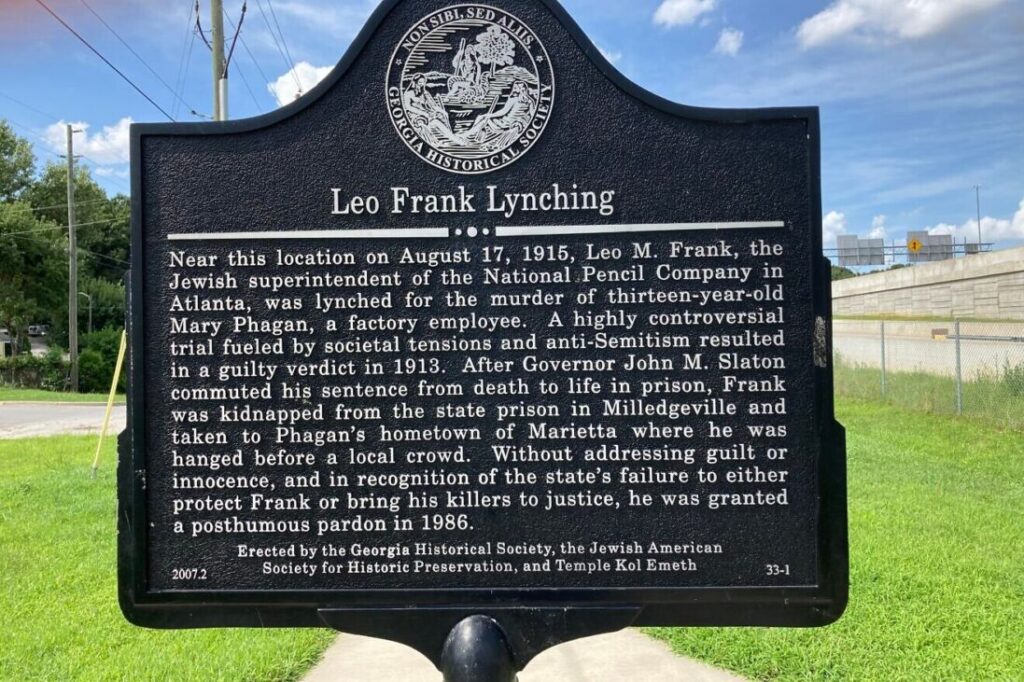
Karen Paikin Barall
The final performance of “Parade,” a Tony Award-winning musical, was recently held at the Kennedy Center for the Performing Arts in Washington, D.C. It told the story of the 1913 murder of Mary Phagan, a teenage girl in Atlanta, and the flawed trial, conviction, and, ultimately, the vigilante lynching of Leo Frank, a Jewish New Yorker transplanted to the American South who managed the factory where the murder took place. The trial was marred by antisemitism, bribery, coerced testimony and mob intimidation.
Though the curtain has closed, Frank’s conviction marks one of the most infamous miscarriages of justice in American history, and it leaves us with critical and urgent lessons we must use to confront the challenges Jews are facing today.
Antisemitism is seeping into nearly every part of American life — the schools, health-care system, unions, public spaces. It can be heard in chants on college campuses, seen in synagogues defaced with hate and spread through conspiracy theories online. The patterns are the same as in Frank’s day: Jews scapegoated, leaders staying silent and crowds too willing to follow the mob.
Then-Gov. John M. Slaton of Georgia stood as the rare exception. After reviewing the case, he commuted Frank’s death sentence in 1915, knowing it would cost him dearly.
The backlash was so fierce that he and his family were forced to flee their home. Yet in that moment, he showed what true moral leadership looks like: the courage to stand up to a mob and do what is right, even when the price is great.
As Slaton himself declared, “Two thousand years ago, another governor washed his hands and turned over a Jew to a mob. For 2,000 years, that governor’s name has been accursed.”
That responsibility does not fall on individuals alone; it rests on the institutions and leaders who shape our society. When lawmakers stay silent as antisemitic tropes are voiced even within their own political parties, they are complicit. True courage is speaking up, condemning rhetoric and pushing for stronger protections for Jewish communities.
When university presidents claim “neutrality” as students chant for the destruction of Israel, they abdicate their responsibility. Courage is calling out that hate, ensuring Jewish students are safe and making it clear that intimidation has no place on campus.
When CEOs dismiss antisemitic remarks in the boardroom or excuse bias in the workplace, they signal tolerance for hate. Courage is setting a zero-tolerance standard and backing it up with action. And when health-care leaders allow Jewish doctors, nurses or patients to be singled out or harassed because of their faith, they betray their mission of care. Courage is making sure that hospitals and medical institutions remain safe places for everyone, and where bigotry has no place.
Leo Frank’s story shows what happens when hatred and silence prevail. Gov. Slaton’s legacy shows what it means to choose courage over convenience.
As we look to honor America’s 250th anniversary next year and lift up untold stories and unsung heroes, we must turn to the bravery of those who spoke out against injustice, who put principle above politics. When we tell these stories, we inspire others to follow in their footsteps. True patriotism is not joining the mob but standing against it, and that is how we will secure the next 250 years of freedom and justice for all.
Karen Paikin Barall serves as chief policy officer at The Louis D. Brandeis Center for Human Rights Under Law, a civil rights organization that uses the law to combat antisemitism in all sectors, from kindergarten to 12th-grade schools to the college campus, unions, health care, sports and corporations.




